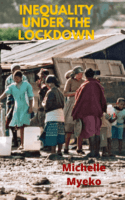Are you feeling anxious or stressed during the lockdown? You are not alone, there has been a major rise in feelings of anxiety and loneliness around the world due to the current pandemic, and also from the lockdown measures which have been put in place to curb the spread of it.
I spoke to psychologists and social workers to get an understanding of the issues faced by many young adults during this lockdown period, and ways to deal with them.
Yonela Tanase is a social worker for Jelly Beanz, a non-profit organization which supports children and families who have experienced trauma and abuse. Tanase highlighted that for many South Africans, fears of the virus come secondary to issues of food and job security.
“The common feeling around most of the families and children I worked with was the uncertainty of not knowing when this is going to end, and how they will be able to make their means meet if they are not working,” said Tanase.
Tanase said that during the lockdown, the mental health of parents and children are very related.
“Sometimes parents when they find themselves dealing with their own anxieties they might take that out on the children in a negative manner. Which is why it is really important for parents to deal with their anxieties first,” says Tanase.
It is, after all, very easy to vent or get angry with someone else for small things if you are feeling frightened or anxious in yourself. But this is damaging to relationships and doesn’t help the situation at all, especially when you can’t get away from the other people who are in lockdown with you! Rather recognise your feelings, and don’t dump them onto someone else.
Tanase says that the two most important tools for dealing with this anxiety are awareness and communication between family members. She said all this fake news and misinformation can have a negative impact on your mental health, because it only creates more fear and confusion
“Awareness is the most powerful tool because if you have facts and are aware of what is happening around you, then you are more able to deal with it,” said Tanase.
So be sure to get your information from a source that you trust, like a news site, or like the government’s Corona website, rather than believing too much you see on social media! Don’t spend too much time on this though, as if you follow the news all the time it can make you worry too much.
Marita Rademeyer is a clinical psychologist at Jelly Beanz. She says that from her recent work experience, she has seen a major rise in anxiety among young adults, which is due to uncertainty around school, employment and not being able to see friends, who make up many youths’ support structure.
“For most young people the worry and anxiety is not about Corona, it is about school. How am I going to pass this year? Where am I going to get to work? Many young people I am working with at the moment have tremendous fear about the future,” says Rademeyer.
She says that many matriculants are worried that they will not complete their school year.
“This anxiety can be immobilising,” says Rademeyer.
So it is important to realise that you cannot control what is going to happen – you cannot decide about lockdown, or the school terms, for example. But you can control how you respond to these things.
Rademeyer suggests that you write down a list with all the resources you have access to, social or material.
“If I have a television, then I make a conscious decision to catch up on a series that I used to like. If I have access to wifi, then I can watch some webinars on something that I have an interest in. My other resources are that I have a neighbour who is good at gardening, can I ask him to teach me what he knows. Step out of immobilised mode, and look out for resources and be conscious of your current situation, I think this could reduce stress,” says Rademeyer.
So what activities can you do that will help you in your future, and who can you find to support you? Make a list of these things. They can include small things, like doing 10 minutes of exercise every day, or things like doing online courses, if you have access to internet, or reading a book.
Rademeyer also stressed that many family members have experienced hardships and periods of uncertainty in their lifetimes, so one can pick their brains about ways to cope with the current situation.
“I have seen many people immobilised by fear. All of us have stories in the family of overcoming such major events, we have to try to tap into what they went through and try to see a future past this chaos,” said Rademeyer.
So ask others you trust about challenges they have gone through, and how they did it. After all, human history is full of war and disaster – it seems this is part of the human condition – but there are also stories of hope and courage. And even long world wars – and apartheid – eventually came to an end!
Other advice centres have also given out mental health tips. Here are some we think are useful:
Routine: it can be useful to have a routine to your day. For example, read or study at the same time each day, exercise at a similar time. This helps to make you feel more in control of what is happening (and also lessens the decisions you have to make about what to do all the time!)
Fresh air: Even if you are confined in a small space, do breathe in fresh air from outside to calm your mind. And use breathing to help you connect your mind to your body. Whenever your mind becomes scattered, try to use your breath to calm your mind. Take in five deep breaths and let them out slowly.
Practice mindfulness. Focus on the current moment, rather than on the future which is unknown.
Do calming activities. Do something that relaxes you such as reading, drawing, exercising.
Practice self-acceptance. We are all operating under stress at the moment. It helps to practice self-acceptance. This means accepting yourself, your situation and your life, without any blame. We are all trying our best in this very difficult situation.
Reach out. Contact friends, family and loved ones. Phone, send messages or video call depending on your access to the internet.
Finally, if you are really struggling, then here are numbers you can call:
South African Depression and Anxiety Group: 0800 567 567 (toll-free counselling between 8am and 8pm)
Lifeline: 0861 322 322 (24/7 National Counselling Line)
Lifeline: 0800 150 150 (24/7 Gender Violence toll-free line)
Lifeline: 0800 012 322 (24/7 Aids Helpline)
FAMSA: 011 975 7106/7 or email: national@famsa.org.za
There are also more numbers on this pdf
And if you are being abused, here are some numbers to call:
GBV command centre: 0800 428 428 or *120*7867# (free)
Urgent victim response line: 0800 150 150
Reporting crime to SAPS: 08600 10111
Tell us: what advice or activities have you found most useful in lockdown?




